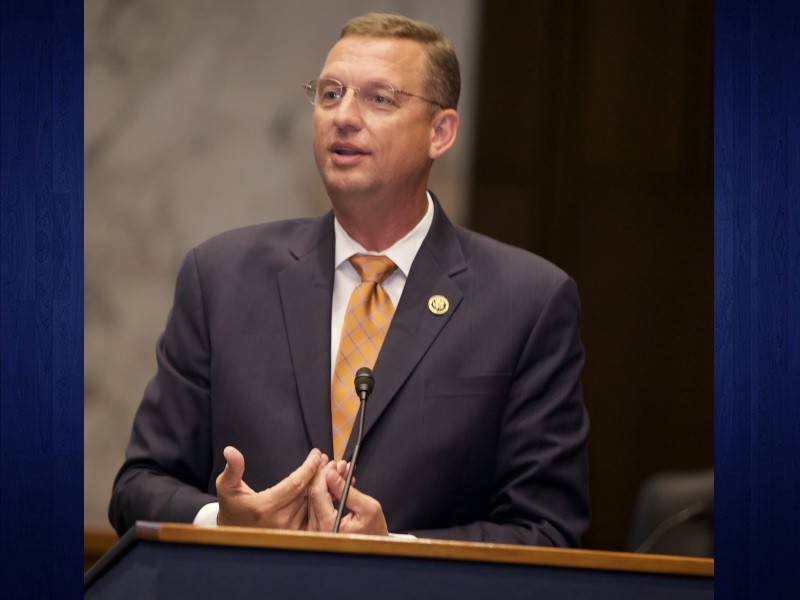Ninth District Congressman Doug Collins introduced a House Resolution Friday that would make an impact on Georgia's growing music industry.
"It brings together the creative community, our songwriters and others, with the digital community, and the big picture in that is the way a lot of people are now listening to music, like through interactive digital streams," said Collins. "It modernizes how the songwriters and artists are getting paid as well as giving protection to (digital services) and providing an easier outlet for, the digital services to find those songs and provide the royalty payments and also proved them protection from infringing on anyone's copyrights."
The Gainesville native said the Music Modernization Act would have a positive effect on musicians not just in the U.S. or the state, but on local economies, including in Gainesville and the North Georgia region.
"We have the John Jarrard concert in town which highlights our local songwriters in our community and brings songwriters in. It's been one of our largest charity events in town, but it's also providing a great deal of entertainment for the creator community to show what they do," said Collins. "John Jarrard was a big part of that, and Bruce Birch... who recently went back to Nashville, but you've got a lot of songwriters and musicians in Northeast Georgia, the Ninth District, in Georgia. Just look on the charts of any sector and you'll see a huge Georgia influence. Rap, classical, jazz, urban, alternative to, of course you can't turn on a country station without hearing one of our Georgia artists or songwriters."
Collins said he became interested in the intellectual property aspect of copyrights while serving as a senior member of the Judiciary Committee. One problem he saw was that many laws were showing their age, with the rules in question being last updated almost 20 years ago.
"We have issues, especially in music, that go all the way back to the 1900's, when they were first on player pianos and how player pianos got paid. Going to now, you can get any music you want through an interactive digital stream, it's time to make sure we not only provide for the content providers and content creators and looking ahead into the future so both of those can prosper and provide people with music and the entertainment they have come to enjoy.
The Music Modernization Act encompasses several sections, listed below, according to the the Congressman.
Section 115 Reform ends the bulk Notice of Intent process through the Copyright Office. This can prevent songwriters from receiving compensation either in a timely manner or even at all when their work is used. In the new proposal, digital services would fund a Mechanical Licensing Collective and be granted blanket mechanical licenses for interactive streaming and the digital download of musical works. The MLC would be governed by publishers and self-published song writers. This would also address matching songwriters and publishers to their recordings on digital platforms.
Section 115 regulates musical compositions and has done since 1909, even though recorded music did not exist at that time. It allows anyone to seek a compulsory license to reproduce a song in exchange for payment of a statutory rate. The Copyright Royalty Board (who sets the statutory rate) is currently directed to use a legal standard to determine if a rate doesn't reflect market value. In the new Act, a Willing Buyer/Willing Seller Standard would replace that, requiring a court to consider free-market conditions when determining rates.
ASCAP and BMI currently are each assigned a single, respective rate court judge. Every case must be adjudicated before each performance rights organization's perspective designated consent decree judge. The newly introduced "Wheel" Approach would allow for a randomly assigned judge from the Southern District of New York. This rotating selection would mean a new judge without prior impressions could settle rate-settling disputes.
The last focus is to appeal Section 114(i) of the Copyright Act. This section currently forbids federal rate courts from overseeing the consent decrees that govern the two major PROs from considering sound recording royalty rates as a relevant benchmark when settling performance royalty rates for songwriters and composers. Collins felt this notion was unfair and at the expense of creators . In the Act, the industry would move to a system in which PROs and creators could present evidence to judges for consideration, with the hopes that songwriters and creators would get fairer rates for their public musical performances.
Representative Hakeen Jeffries (D- N.Y.) is the bill's lead co-sponsor. Additional cosponsors include Chairman of the Democratic Caucus, Rep. Joseph Crowley (D-N.Y.), Reps. Diane Black (R-Tenn.), Marsha Blackburn (R-Tenn.), Steve Cohen (D-Tenn.), Ted Lieu (D-Calif.) and Pete Sessions (R-Texas).









